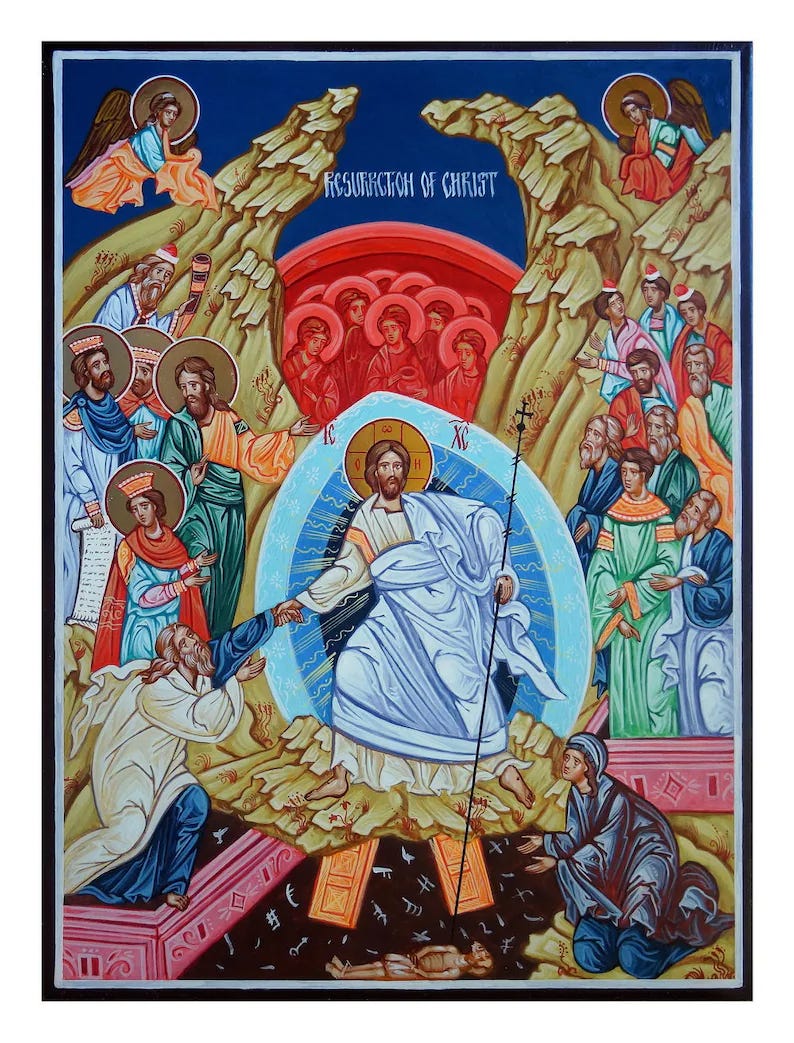(Sun., Oct. 29: This image taken from the Israeli border with the Gaza Strip shows black smoke rising amid the ongoing battles between Israel and the Hamas militants. Fadel Senna/AFP/Getty Images)
As we transition from this year into the next, no-one can have any illusions that any of the same-old, same-old resolutions are going to work. Or even come to birth, for that matter. In a time of wars, famines, natural disasters, and man-made misery – not least upon the climate and our fragile eco-system – what are we supposed to do? What can we do? I don’t know about you, but while I am not fearful because I do trust in the love and goodness of God, our human ability to really ruin everything - as evidenced by the current horrors in Palestine, Israel, Sudan, Yemen, Ukraine, Latin America and most everywhere - actually, do incite outrage and indignation in me.
“Pray,” you say? Well, the religious-minded certainly advocate that! I had a go when I was asked to lead Intercession in my local Church of England, Third Sunday of Advent, service. But I was pretty restrained, considering! I was in more of a mind to rant in the fashion of King David:
‘O GOD, COME AND SLAY THESE BLOOD-THIRSTY, MURDEROUS MEN!
FOR I CRY OUT, “DEPART FROM ME, YOU WICKED ONES!”
SEE HOW THEY BLASPHEME YOUR SACRED NAME AND TAKE YOUR NAME IN VAIN!
LORD, CAN’T YOU SEE HOW I DESPISE THOSE WHO DESPISE YOU?
FOR I GRIEVE WHEN I SEE THEM RISE UP AGAINST YOU.
I HAVE NOTHING BUT COMPLETE HATRED AND DISGUST FOR THEM.
YOUR ENEMIES SHALL BE MY ENEMIES!’ (Psalm 139: 19-22)
Well, I’m pretty sure that’s not the spirit and language of prayer you would be expecting in an emotion-free, Holy Spirit-free Anglican church service! (Or Baptist, Methodist, Roman Catholic, Eastern Orthodox, United Reform, Presbyterian, Pentecostal, Uncle-Tom-Cobbly-and-All-Free-Church etc, etc praise and worship, for that matter.)
Yes: pray we need to; but how? Why? To what purpose, exactly?
In his must-read composite book, The Powers That Be (Galilee, Doubleday, 1998), Walter Wink lays out how our fight really is not against flesh and blood brothers and sisters, but against the “Powers That Be:” – the powers, principalities, and forces ‘in the air’ - to use St Paul’s famous depiction.
These include the Churches! (If any group of humans is more prone to “taking the name of the Lord in vain” than the Church I’ve yet to find it! See Jesus’s opinion in Matthew 7: 21Not everyone who says to Me, ‘Lord, Lord,’ will enter the kingdom of heaven, but only he who does the will of My Father in heaven. 22Many will say to Me on that day, ‘Lord, Lord, did we not prophesy in Your name, and in Your name drive out demons and perform many miracles?’ 23Then I will tell them plainly, ‘I never knew you; depart from Me, you workers of lawlessness!’…)
In fact, as Wink points out, he suddenly realised the significance of the letters from Jesus to the Seven Churches in John’s Revelation of Jesus: They are not addressed to the Churches (or Bishops, Pastors, etc) but to The Angel of the Church in… This clearly directs our attention, then, when seeking to pray for what is happening in the Church…and in the world. The Book of Daniel, for example, teaches us about the struggle “in heavenly places” – in God’s dimension so to speak. (See Daniel 9:20-23; 10:10-14) So that “behind” every material entity on earth lie spiritual equivalents in the spirit world. Angels, in other words. The Scriptures clearly reveal that there are angels behind nations, regions, and cities. Wink lays out the wider picture for us, today, to explain that such spiritual forces are also behind our Industry, Agriculture, Business, Education, Economics, Military, Politics and Governments, and much more besides. He concludes:
If we want to change those systems, we will have to address not only their outer forms, but their inner spirit as well. (Op Cit. p4)
“EVERYTHING,” as Rob Bell so well explained, “is spiritual” - as well. Or, in Wink’s words: “From DNA to the United Nations…Everything has a spiritual aspect. Everything is answerable to God.” (Op Cit. p5)
So, if we are going to have any hope of really affecting change in our world, we need to deal with the invisible powers in order to have visible outcomes. Our given means of accomplishing this is prayer. Not repetitive, ritualistic, rote-religiosity rehearsed in high-blown phraseology, either; but in honest, heartfelt, emotionally engaged, real-life, say-it-like-it-is (even if it involves some swearing!), personal, practical, poignant, CONVERSATION.
Praying, writes Wink, is rattling God’s cage and waking God up and setting God free and giving this famished God water and this starved God food and cutting the ropes off God’s hands and the manacles off God’s feet and washing the caked sweat from God’s eyes and then watching God swell with life and vitality and energy and following God wherever God goes.
Praying is a dialogue of partners, a discussion about intentions and desired outcomes. It is also about confronting and causing correction of that which is amiss, off, or downright evil. It’s not so much a polite request as a passionate projection in time, space, and spirit of all that we deeply feel and earnestly desire. God can relate to that. According to Wink, “Even a small number of people [two, or three, say?], firmly committed to the new inevitability on which they have fixed their imaginations, can decisively affect the shape the future takes.”
James tells us, “For tremendous power is released through the passionate, heartfelt prayer of a godly believer.” (Jas 5:16b)
A word of warning, however.
Contrary to methods of “spiritual warfare” common in a certain prayer practice among some evangelicals and charismatics, we should be engaged in such a way – and with the precise aim of – altering the spirituality of families, corporations, nations, and churches, etc. It is not that evil angels overtake human institutions in order to pervert them. Rather, demonic agencies arise within institutions themselves when they abandon their divine vocation and obligation to contribute to a wholesome and life-giving society in favour of selfish, narcissistic, power-obsessed, and so, lesser objectives. Rather than “casting demons out” of places, cities, businesses, governments, even, we would be better calling on God – and co-operating as co-workers with God - to transform them to their divine vocation. Our spiritual dialogue is with God, not demons.
If, as John insists, “the whole world lies in the evil one,” then as transformed men and women in Christ, and with Christ in us living in this world, we are to be insurgents for righteousness as well as ambassadors of reconciliation for the Kingdom of Heaven. To take on the Powers That Be, empowered and dominant as they are, will cost us everything. It will require us to be 100% committed to the Father, Son, and Holy Spirit in every aspect of the life we live and the lifestyle we choose. Christ has done God’s part and, in a real way, “It is finished!” as Christ yelled out in agonising victory. Now, as members of his Body, we get to do ours. However, only by “abiding” in Him have we any hope of completing our tasks. The Adversary may well be beaten – Jesus said so – but he’s not going down without a fight.
Dealing with the powers, principalities, and forces of wickedness in the spiritual realm demands, according to Watchman Nee, “an utterness of spirit Godward that in itself effectually deprives Satan of any moral ground in us he may claim [erroneously; but all too effectively] to possess…Evil spirits can see right through the witness of man. They can tell when it is compromised by being half-hearted or insincere. They are aware when we are holding back a part of the price… ‘Jesus I know, and Paul I know; but who are you?’ (Acts 19:15. From Love Not the World CLC 1968)) We are enabled and empowered in Christ. Then, and only as we remain awake to, and aware of, this victorious truth can we truly do all things through Him who authorises and empowers us!
As Wink concludes: “We pray to God, not because we understand these mysteries, but because we have learned from our tradition and from experience that God, indeed, is sufficient for us, whatever the Powers may do...
…This is the goal: not only to become free from the Powers, but to free the Powers. Jesus came not just to reconcile people to God despite the Powers, but to reconcile the Powers themselves to God. (Col. 1:20). We seek not only to break the idolatrous spells cast over people by the Powers, but to break the ability of the Powers to cast idolatrous spells. ‘The Son of God was revealed for this purpose, to destroy the works of the devil’ (1 John 3:8). We need to escape idolatry, not this planet. We do not seek to rid ourselves of subsystems and structures in order to secure an individualistic paradise on earth or an afterlife in heaven. We seek, rather, to relate these systems to the One in and through and for whom they exist, and in whom all things hold together” (Col. 1:16-17).
Amen!
Grace and peace and powerful praying for – and throughout - the coming year. Go well, Wayfarers.







